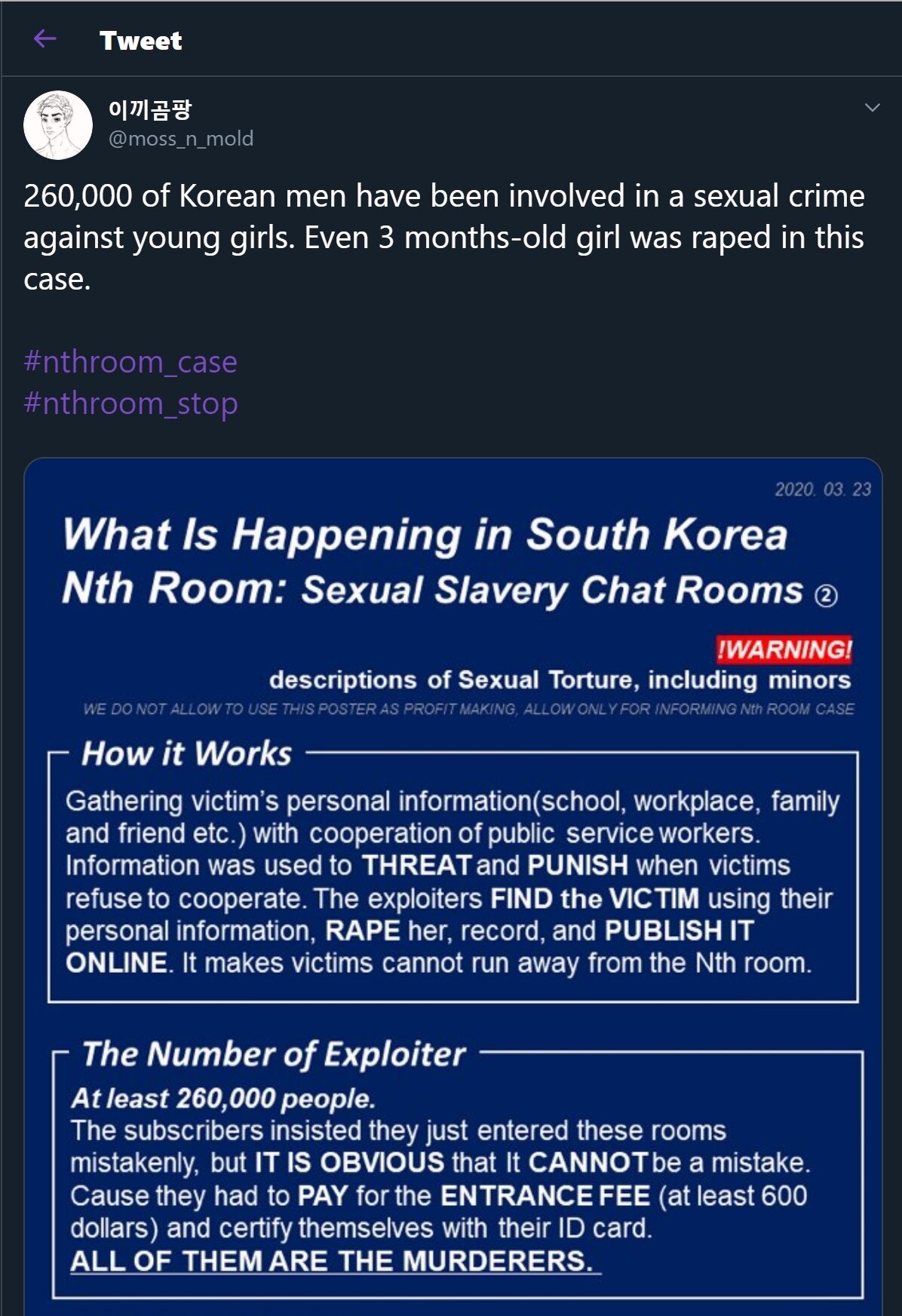Compass World: "the nth room"
A poster from user @moss_n_mold on Twitter, detailing the nth room chat. (Twitter)
South Korean police apprehended a suspect on March 16 in relation to a recently uncovered online sex trafficking ring, best known by its Telegram chatroom title “the nth room.” The suspect, 25-year-old Cho Joo-bin, is thought to be the group’s ringleader. Cho allegedly traded videos and images of violent sexual acts, child pornography, and other sexually exploitative materials with more than 260,000 members of the chatroom in return for cryptocurrency. As authorities continue to arrest additional perpetrators in “the nth room,” public outrage over the case is mounting, and concerns regarding the invisible nature of online criminal activity are rising.
Chatroom Dealings
According to an investigative report by the Seoul Broadcasting System (SBS), Cho is a recent university graduate who began his online criminal endeavors shortly before graduation by scamming users online with promises of guns and drugs. However, last spring, Cho transitioned to sex trafficking by establishing the nth room chat group. Going under the pseudonym baksa, which means “doctor” in Korean, Cho amassed thousands of viewers and active members by distributing sexually exploitative media in return for cryptocurrency. Since Cho’s arrest, the National Police Agency told reporters that 124 people have been arrested and 18 detained in relation to the crime so far.
Public Information
Though the investigation is ongoing, the South Korean police estimate that Cho tricked and coerced more than 74 women, 16 of whom were underage, into filming sexually degrading and violent videos of themselves for him. Authorities reported that Cho used coercive tactics such as doxxing (researching and publicly releasing another’s private information), bribing low-level public officials for victims’ private details, and threatening revenge porn or physical harm to get these women to do these things for him. In an interview with HuffPost Korea, two anonymous victims expressed persisting fears of retribution, public humiliation, and impunity despite Cho’s arrest. “I was going to kill myself because of baksa, and now I’m terrified that he’s going to be released after a maximum ten-year sentence,” one victim said, while another revealed that Cho threatened to rape her in her own home if she did not cooperate with his demands. “He [later] threatened to release my personal information if I didn’t continue producing material [that was more graphic and violent],” she said.
Though public discourse in South Korea was dominated by coronavirus-related issues in the last few weeks, the nth room case immediately ignited an uproar. In reaction to Cho’s arrest, citizens petitioned for the public release of implicated users’ personal information. “It is a relief that the investigation into the nth room is ongoing and that a number of perpetrators were arrested,” the petition reads, “however, such crimes will resurface… because not all 260,000 users of the nth room will be punished… [as such] we ask that the names, occupation, place of employment, age, and face of each perpetrator is released publicly.” Though no decision has yet been made regarding the petition’s demands, President Moon Jae-in stressed the need for a continued and thorough investigation.
Cryptomaniacs
Cryptocurrency, used by Cho and his customers, is quickly becoming the currency of choice for online criminals ranging from drug dealers and money launderers to Salafi jihadists and right-wing extremists. In a 2019 study on illegal activities financed by cryptocurrencies, researchers estimated that “illegal activity accounts for a substantial proportion of the users and trading activity in bitcoin… approximately one-quarter of all [bitcoin] users… are associated with illegal activity.”
Why might virtual currencies, which are riddled with considerable market volatility, fake volumes, and a lack of transparency, be so widely favored by criminals? First, cryptocurrencies afford users anonymity and speed that credit card transactions cannot provide. Second, though physical cash transfers also present some secrecy, cryptocurrency transactions are infinitely lighter than cases of cash and require no scheduled visits to back alleys. Finally, the primary challenge of cryptocurrency—the lack of a centralized authority that governs its value, distribution, and circulation—is the very feature that makes it so appealing to criminals operating online. Clandestine, decentralized cryptocurrency makes tracking the financial transactions of criminal organizations very difficult for law enforcement and intelligence officers.
The Court of Public Opinion
The online petition regarding the nth room amassed more than 2.5 million signatures just three days after it was drafted; this accounts for roughly 4.4 percent of the South Korean population and is the highest number of signatories ever recorded since the government created its online petition platform. This level of public engagement is forcing South Korean government officials to grapple with the prosecutorial and legislative challenges that will certainly follow the investigation. As suggestions for reforming existing sexual exploitation and sentencing laws roll in from legislators, experts, and citizens, the nth room case is poised to become a watermark for conversations around the realities of sexual exploitation and trafficking both in South Korea and around the world in the new digital age.

